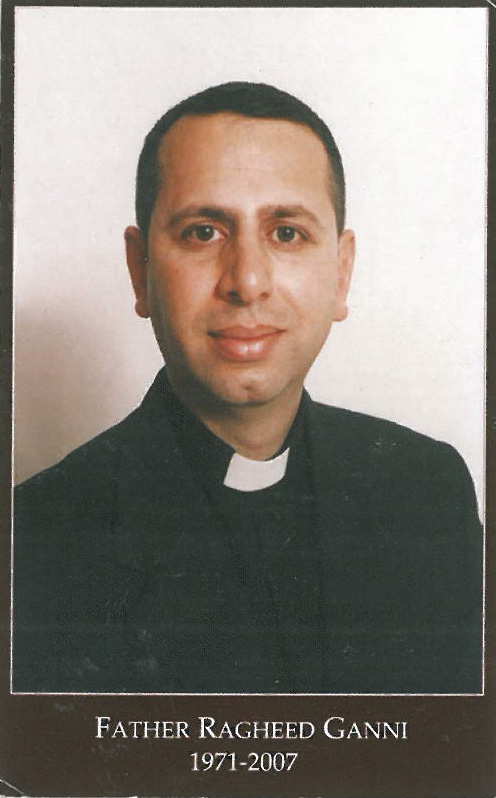 Holy card of Father Ganni.Iconic imagery of the war in Iraq shows the U.S. Army pulling down the statue of Saddam Hussein in Baghdad’s Firdaus Square on April 9, 2003.
Holy card of Father Ganni.Iconic imagery of the war in Iraq shows the U.S. Army pulling down the statue of Saddam Hussein in Baghdad’s Firdaus Square on April 9, 2003.
While a sledgehammer-wielding man made little headway on the statue base, soldiers rolled up in a tank, wrapped a chain around the statue’s neck, covered the face with the U.S. flag and let ‘er rip. Hundreds of Iraqis cheered and celebrated their liberation from the brutal dictator.
But not everyone was so moved. In fact, Father Ragheed Aziz Ganni predicted persecution for minority Christians and brethren Chaldean Catholics as a result.
“I remember him saying that if Saddam Hussein was overthrown, (Christians) will be persecuted,” said Kenrick-Glennon Seminary rector Father James Mason, who studied with Father Ganni as a seminarian in Rome and counted him among his friends. “He wasn’t saying, ‘I’ll be a martyr,’ but he was saying that persecution will begin when (Hussein is) removed.”
Just 50 months later, in June 2007, Father Ganni became a martyr in Mosul, Iraq. He and three deacons, including a cousin, were gunned down as they drove in front of Holy Spirit Church, where Father Ganni had just celebrated Mass on the feast of Pentecost. The gunmen then “strapped explosives to the car so they wouldn’t have any remains for the funeral,” Father Mason said, somberly. “It was really planned and intentional.”
The Vatican’s Congregation for Saints’ Causes recently gave permission for the opening of the sainthood cause for Father Ganni and the deacons, recognizing Father Ganni’s decision to remain at the parish and celebrate the faith.
“He had been warned, threatened with his life (and) told to leave the parish, but he refused,” Father Mason said. “It was quite clear he chose to stay knowing his life was in danger.”
Father Mason and Father Ganni were classmates at the Pontifical University of Thomas Aquinas, known as the “Angelicum,” in the late 1990s and early 2000s. Father Ganni lived at Pontifical Irish College; Father Mason at Pontifical North American College. He recalled his friend as “kind and faithful and really a good seminarian.”
Father Mason keeps a photo of himself, Father Ganni and mutual friend Father Don Kettle of Perth, Australia, in his breviary, along with a Father Ganni holy card. Father Mason received the holy card from a Chaldean Catholic seminarian from Detroit for whom he led a 30-day silent retreat.
“I just happened to mention Ragheed, and his eyes went open; it was kind of neat,” Father Mason said. “The Chaldean community has been praying for (Father Ganni’s) beatification.”
With the photo and holy card in Father Mason’s breviary, his buddy is never far from his thoughts. In fact, Father Mason isn’t shy about asking for Father Ganni’s intercession.
“Yes, yes,” Father Mason said, emphatically, adding that his friend’s martyrdom “brings to life the suffering Church, that there are martyrs today. In much of the world, Christians are persecuted. We read stories about martyrs in past times, but this is real.”
St. John Paul II called the 20th century “the century of martyrs.” Many are killed in the Middle East, where Father Ganni told Father Mason that religion and politics are “complicated”.
According to Father Ganni, as told to Father Mason, Hussein protected the Christian minority in building his coalition.
“Christians there were just trying to survive; they were such a small portion of the population,” said Father Mason, adding that Syria faces similar complication under dictator Bashar Hafez al-Assad. “That’s why you hear Christian leaders in the Middle East saying, ‘I hope you understand that if Assad goes, the Christian population will be decimated.’ That’s what happened in Iraq. I remember Father Ganni telling me that. He said you have to understand the ramifications. You can have an evil ruler but must understand more evil can sometimes come.”
Sadly, Father Ganni proved to be correct with that assessment, and paid with his life.
>> Syrian Christians
Concern about Christian persecution in Syria has existed for more than 20 years, as William Dalrymple wrote in “From the Holy Mountain,” published by Penguin Books in 1997. A few excerpts:
“The period of uncertainty for Syria’s Christians came to an end with Assad’s coup d’etat in 1970. … Assad kept himself in power by forming what was in effect a coalition of Syria’s many religious minorities. … In Assad’s Syria Christians have always done well. … The only problem with all this, as far as the Christians are concerned, is the creeping realization, that they are likely to expect, perhaps far more savage, backlash when Assad dies or when his regime eventually crumbles. The Christians of Syria have watched with concern the Islamic movements which are gaining strength all over the Middle East. … As long as the bottle is closed with a firm cork all is well. But eventually the cork will come out. And then no one knows what will happen to us.”
This in no way justifies the evil acts of the Assad regime, but helps explain concerns among the Christian minority.